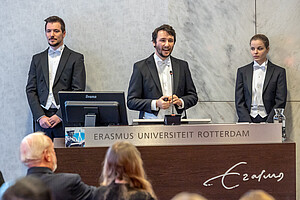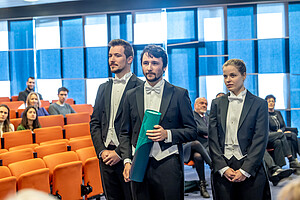PhD Defence Ymro Hoogendoorn

In his dissertation, Vehicle Routing with Varying Levels of Demand Information, ERIM’s Ymro Hoogendoorn studied the vehicle routing problem, for which he centred the exact methodology in three different levels of demand information: deterministic, stochastic and sensor-driven. The vehicle routing problem encompasses the challenge of efficiently serving a set of customers with a fleet of vehicles while minimising the travel costs and ensuring each vehicle starts and ends at a central depot. Ymro enhanced the branch-price-and-cut algorithm, introducing resource-robust cuts for the capacitated vehicle routing problem with deterministic demands, resulting in speedups for specific instances. The study also pioneered a state-of-the-art integer L-shaped method for optimal solutions in the vehicle routing problem with stochastic demands, combining and enhancing existing literature. When applied to a single-period waste collection problem with sensors, the algorithm suggests optimal sensor placement at locations with highly variable waste amounts. Overall, Ymro’s research contributes to increasing the efficiency of routing processes, which can thus save substantial amounts of costs while making a positive environmental impact.
Ymro defended his dissertation in the Senate Hall at Erasmus University Rotterdam (EUR) on Friday, 19 January at 10:30. His supervisors were Prof. dr. Albert Wagelsman (EUR), Prof. dr. ir. Rommert Dekker (EUR), and Dr. Remy Spliet (EUR). Other members of the Doctoral Committee were Prof. dr. Dennis Huisman (EUR), Prof. dr. Sanne Wøhlk (Aarhus University), Prof. dr. Michel Gendreau (Polytechnique Montréal), Prof. dr. Pedro Munari (Federal University of São Carlos), Dr. Shadi Sharif Azadeh (TU Delft), and Dr. Kevin Dalmeijer (AI4OPT).
About Ymro Hoogendoorn

The research of Ymro Hoogendoorn focuses on exact methodology in transportation problems. He is not afraid to pull out all he can to prove guarantees for his algorithms. Nevertheless, he likes his problems to be rooted into practice.
He graduated cum laude in 2017 from the bachelor Econometrics and Operations Research, and summa cum laude in 2018 from the master Econometrics and Management Science, both with specialization Operations Research and Quantitative Logistics. Immediately afterwards, he started a PhD project at the Erasmus University Rotterdam.
First, he started extending the work of his master thesis with Kevin Dalmeijer. Afterwards, Remy Spliet approached him with the waste collection project, in collaboration with Daniele Vigo. When he noticed how much there was left to improve for the integer L-shaped method for the vehicle routing problem with stochastic demands, he diverted his attention to that problem.
In the fall of 2022, he went to Polytechnique Montréal in Canada on a research visit to collaborate with dr. Thibaut Vidal. Together, they are working on a machine learning approach to bridge the gap between company preferences and research practice.
As is almost tradition with Operations Research PhDs, Ymro is also a fan of board games. This did not go unnoticed, and since September 2019 he organizes the monthly PhD Game Night.
Thesis Abstract

The vehicle routing problem is the problem of serving a set of customers with a fleet of vehicles such that the travel costs of those vehicles are minimised while making sure each vehicle starts and ends at a central depot. This thesis focuses on the exact methodology for the vehicle routing problem with three different levels of demand information: deterministic, stochastic and sensor-driven.
First, we look at set partitioning and set covering problems that are solved by a branch-price-and-cut algorithm. We introduce a new category of cuts, called “resource-robust”, which does not complicate the pricing problem if specific resources are included. We create new cuts for the capacitated vehicle routing problem, with deterministic demands, that are resource-robust when the ng-route relaxation is used, which leads to speedups for certain instances.
Second, we focus on the vehicle routing problem with stochastic demands. We develop a state-of-the-art integer L-shaped method to solve the problem to optimality. The algorithm uses all techniques from the literature, improves on some of these and uses new valid inequalities. Using this algorithm, we also investigate three commonly-made assumptions in the literature from a theoretical and computational perspective.
Third, we investigate a single-period waste collection problem with sensors. We can adjust our routing decisions based on the sensor readings. We derive theoretical properties and develop an algorithm to approximate the cost savings achieved given a certain sensor placement. Then, we investigate the effectiveness of several sensor placement rules and how they fare under sensor uncertainty.
View photos of Ymro's PhD Defence
Photos: Chris Gorzeman / Capital Images


